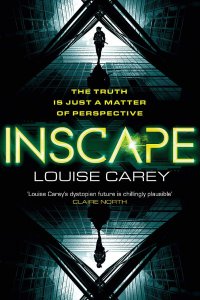Paul Di Filippo Reviews Inscape by Louise Carey
 Inscape, Louise Carey (UK: Gollancz 978-1473232747, £14.9920, 432pp, trade paperback) January 2021
Inscape, Louise Carey (UK: Gollancz 978-1473232747, £14.9920, 432pp, trade paperback) January 2021
Some genetically talented, culturally nurturing families produce writers across multiple generations, or multiple sibling iterations in the same clade. Famous literary lineages are almost too numerous to name. John le Carré and Nick Harkaway. Stephen King and progeny. Nathaniel and Julian Hawthorne. The McCaffreys. Peter and Emma Straub. The Powys clan; the LaFarge clan. And on and on.
Certainly the case of the Careys is a prime living example. Mike Carey has the highest profile, followed by his wife, Linda, and then by daughter Louise. As a unique triple byline, the trio are responsible for two novels: The City of Silk and Steel and The House of War and Witness. Now Louise steps out with her solo novel, first in a series: a bold portrait of a hardscrabble future, and one woman who bucks not only the powers that be, but her own hardwiring—a much harder task!
Sometime in our future came the Meltdown Wars: “burning buildings, ragged columns of refugees, whole nations displaced over the course of hours…explosions so hot they melted the camera lens…” But at the present moment, years later, the world situation is improved and stable, although still tenuous and glitchy, thanks to the necessarily heavy-handed governance of various corporations that relate together as grudging allies and subtextual rivals. The two adjacent ones that concern our narrative are InTech and Thoughtfront. The former, more central to the story and our focus, is home to our heroine, Tanta.
Raised as a ward of the state and trained from youth to become a field agent for InTech—part spy, part cop, part CSI investigator, part assassin, part catspaw—Tanta has reached age eighteen as a loyal and enthusiastic InTech patriot. She longs for nothing more than to please her immediate superior, a heartless and caustic upward-striving female bureaucrat named Jen. Some small personal daily moments of solace and tenderness are stolen with her fellow CorpWard, Reet.
Tanta, like all the well-off citizens of this world, runs an Inscape, a neural system that allows mind-to-mind talk, body enhancements, knowledge access, augmented reality overlays, and so forth. Tanta’s model is deluxe—but with a hidden layer known as the Harlowe Programme which she will only gradually come to discern.
Tanta’s latest assignment, her first big case, is to track down some stolen files downloaded onto a hard drive. The nature of the files is unknown, but InTech needs them back. Out in the field, Tanta meets a mysterious enemy operative trained to be equally deadly. After some stirring combat, Tanta is defeated and the files lost.
Back at HQ, Tanta is given a second chance. She is now teamed with Cole, an older male scientist who is her opposite in many ways: timorous, sedate, intellectual. Cole has recently suffered an accident which wiped portions of his memory, but he retains all his professional skills.
Together the pair will have to go undercover in Thoughtfront territory, facing a host of dire challenges, including rescuing a compatriot from a Thoughtfront prison and encountering again that enigmatic nemesis, before returning home where they discover that the real rot is in their own backyard.
Before looking at all the fine things that Carey achieves, I will have to register a dissent with the label of “dystopia” for this book. If that word is to mean anything, it must reference a tyrannical system of governance deliberately intended to keep the mass of people down for the benefit of a small elite, where freedoms are few and repressions are many. This is not what Carey gives us here. Her polities are tough and perhaps too rigid for pure comfort, but they exist as a reaction to the chaos that preceded them. They are Sparta, not Orwell’s Airstrip One.
In any case, Tanta’s unquestioning allegiance to InTech sets up a scenario that has proved potent in much past SF: the loyal lackey who gets awakened. We have seen this in everything from Zamyatin’s We to Pohl & Kornbluth’s The Space Merchants to PKD’s Ubik to Wesley Chu’s Time Salvager series. It’s a great trope, and Carey really works it convincingly and resonantly. Tanta’s awakening comes in believable stages, and is buttressed by stefnal underpinnings. When we leave her at the end of the book (on the precipice of her next adventure, by the way), she has matured and changed immeasurably, and we have enjoyed every step of the journey.
The pairing of her with Cole is the archetypical “dissimilar buddies/partners” motif and works well. Getting several chapters from Cole’s POV helps us empathize as well. (We also get inside Jen’s head a few times, which humanizes her villainy.) The teammates complement each other’s skills and worldviews. But Carey adds a great surprise twist towards the end that deepens their relationship even more.
Carey’s quasi-cyberpunk future does not have a lot of unprecedented bells and whistles, but it’s constructed solidly enough to support the action. And that action is rendered with taut and cinematic virtues. This novel would translate well to the big screen. The long prison break section is great, as are the hand-to-hand fight scenes. Carey’s dialogue is sharp and to the point, as well as often mordantly humorous. Subsidiary characters, such as fellow agent Yasmin Das, are cleanly sketched. The Inscape technology, extrasensory inputs and outputs, is blended artfully into the narration, rendering Tanta moderately posthuman.
With flavors of Richard Morgan’s work, Carey’s initial solo outing shows her to be a robust storyteller with a keen grasp of characterization and plotting, as well as pocketful of insights into how desperate societies—and desperate individuals—will seek to preserve themselves at any cost. One would almost swear she was a CorpWard raised for this artistic purpose—but it’s probably just her good upbringing in the Carey ménage!
 While you are here, please take a moment to support Locus with a one-time or recurring donation. We rely on reader donations to keep the magazine and site going, and would like to keep the site paywall free, but WE NEED YOUR FINANCIAL SUPPORT to continue quality coverage of the science fiction and fantasy field.
While you are here, please take a moment to support Locus with a one-time or recurring donation. We rely on reader donations to keep the magazine and site going, and would like to keep the site paywall free, but WE NEED YOUR FINANCIAL SUPPORT to continue quality coverage of the science fiction and fantasy field.
©Locus Magazine. Copyrighted material may not be republished without permission of LSFF.







